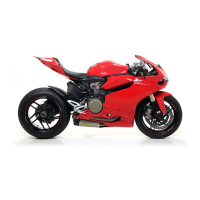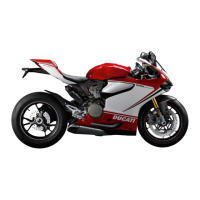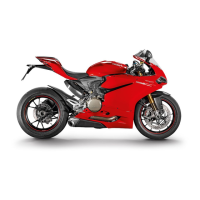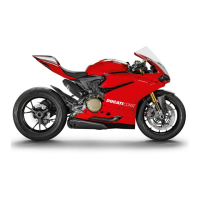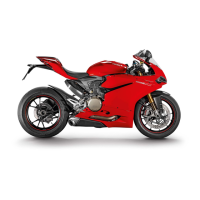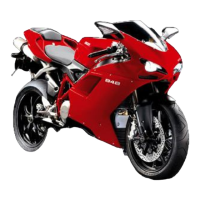Do you have a question about the Ducati SuperBike 1098S and is the answer not in the manual?
Details motorcycle warranty terms and conditions.
Explains symbols and safety warnings for manual interpretation.
Essential safety precautions for riding the motorcycle.
Guidance on weight distribution and load capacity for safe riding.
Information on frame and engine numbers for identification.
Diagram showing the location and numbering of motorcycle controls.
Operation and positions of the ignition switch and steering lock.
Functions of the left handlebar controls including lights, turn signals, and horn.
Functions of the right handlebar controls including engine stop and start.
How to use the clutch lever and adjust its span.
Operation of the throttle twistgrip and adjustment of cable play.
How to use the front brake lever and adjust its distance.
How to operate the rear brake pedal.
How to use the gearchange pedal and adjust its position.
Identification of indicators and gauges on the instrument panel.
Explanation of the primary information shown on the LCD screen.
Procedures for setting and displaying various parameters on the LCD.
Details on the total distance travelled indicator (odometer).
Explanation of TRIP A and TRIP B trip meter functions.
Information on the TRIP FUEL, air, and coolant temperature indicators.
Explanation of the servicing (SERV) and diagnostic indicators.
How to check battery voltage and adjust engine idle speed (RPM).
Features for lap timing, memory, and USB data logging.
Steps to set the motorcycle's clock time.
Table of warning lights and error messages for diagnostics.
Adjusting warning light brightness, backlight, and intelligent headlamp functions.
How the immobilizer system works, including keys and code card.
Steps to override the engine lock if the immobilizer is activated.
Process for obtaining and programming duplicate keys.
Diagram identifying major motorcycle components.
How to open and close the fuel tank filler cap.
Using the seat lock and helmet holder features.
Proper use of the sidestand and related safety precautions.
How to adjust the steering damper for ride quality.
Adjusting rebound, compression, and preload on the front forks.
Adjusting rebound, compression, and spring preload on the rear shock absorber.
Procedure for changing the motorcycle's track alignment.
Steps for removing and reinstalling fairing panels for maintenance.
How to remove and refit the rear-view mirrors.
Procedure for removing the headlamp fairing.
Recommended procedures for the initial running-in period of the motorcycle.
Essential checks to perform before starting the motorcycle.
Step-by-step guide for starting the motorcycle engine safely.
Proper techniques for moving off and braking effectively.
Procedures for safely stopping and parking the motorcycle.
Guidelines for refuelling and fuel tank capacity information.
Location and contents of the toolkit under the seat.
How to check and top up the engine coolant level.
Procedure for checking brake and clutch fluid levels.
How to check the wear on brake pads using indicators.
Recommended procedure for lubricating control cables and joints.
Steps for safely removing and charging the motorcycle battery.
How to check chain tension and lubricate the drive chain.
Instructions for replacing high beam, low beam, and parking light bulbs.
Procedure for replacing the number plate light bulb.
Method for checking and adjusting the motorcycle's headlight aim.
Information on tubeless tyre pressures, wear, and repair.
How to check engine oil level and recommended oil viscosity.
Guidelines for checking, cleaning, and replacing spark plugs.
Best practices for washing and cleaning the motorcycle.
Recommended steps for storing the motorcycle for extended periods.
Planned maintenance operations to be performed by authorized dealers.
Key dimensions, weights, and technical specifications of the motorcycle.
Recommended fluids, lubricants, and their capacities.
Specifications for the engine, bore, stroke, and timing system.
Details on the fuel injection system and front/rear brake components.
Information on the clutch, gearbox, and drive chain specifications.
Technical details about the frame, wheels, and tyre sizes.
Specifications for suspension, exhaust system, and available colours.
Components of the electrical system and fuse box layout.
Key for identifying components in the electrical system diagram.
Color coding for wires and legend for fuse box identification.
Space to record scheduled maintenance services performed.
Safety warnings, noise warranty, and emission control system information for US models.
General riding safety tips and Vehicle Identification Number details.
Diagrams showing the location of various identification and information labels.
Details of Ducati's limited warranty for emission control systems.
| Displacement | 1099 cc |
|---|---|
| Transmission | 6-speed |
| Frame | Tubular steel Trellis frame |
| Rear Suspension | Öhlins fully adjustable monoshock |
| Front Brake | 2 x 330 mm semi-floating discs, radially mounted Brembo Monobloc calipers 4-piston, 2-pad |
| Rear Brake | 245 mm disc, 2-piston caliper |
| Fuel Capacity | 15.5 l (4.1 US gal) |
| Seat Height | 820 mm (32.3 in) |
| Engine Type | L-Twin cylinder, 4 valve per cylinder Desmodromic |
| Power | 160 hp @ 9750 rpm |
| Torque | 123 Nm @ 8000 rpm |
| Front Suspension | Öhlins 43 mm upside-down fork |
| Dry Weight | 171 kg |





